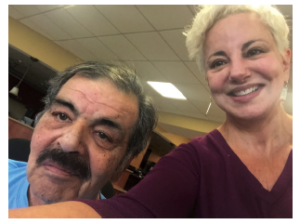What a Difference A Year Makes
It’s difficult to believe that nearly a year has passed since my brother Frank had a stroke.
It’s difficult to believe that nearly a year has passed since my brother Frank had a stroke. He continues to slowly improve with the help of numerous partners in care who I’ve highlighted throughout the year. Respiratory therapists, occupational therapists, speech and language pathologists, and physical therapists are just some of the individuals who have helped my brother improve. During this past year, I often thought how overwhelming it must be for those who have no knowledge of the health care system when a loved one experiences a debilitating illness. In my brother’s case, I and other family members were savvy enough to have at least some idea how to proceed. But what happens when an individual doesn’t have an advocate? How does that patient and the family navigate through the innumerable decisions that must be made? I found that answer this year, as well.

A new partner in care has emerged in recent years: the patient advocate. During the countless hours I spent trying to determine the best courses of action for my brother, I met Annette Ticoras, MD. She is an internal medicine physician who now devotes her time to advocating for individuals who are undergoing a health crisis. Through her company, Guided Patient Services, she provides clients and their families with medical interpretation, direction, and support. Her goal is to ensure that her clients fully understand the options available so they can make the best choices for their health. As Ticoras states, “I firmly believe that peace of mind and empowerment is achieved through a greater understanding of one’s own health care. Patients need a trusted, knowledgeable counselor who can translate the medical jargon, and help them process the large volumes of health information often thrown at them in a short period.” Ticoras strives to treat clients like family and interacts with empathy, honesty, patience, integrity, and caring. Patient advocates understand that confusion and uncertainty can add to the stress felt during a health crisis, and they try to help. This March, the first group of board-certified patient advocates was recognized by the Patient Advocacy Certification Board.
Many of you have followed my brother’s story and reached out with your thoughts and prayers. Know that he (and I) truly appreciate your kindness! During this holiday season, Frank and I send you warm thoughts of comfort and joy. And most of all, we wish you health and happiness now and into the new year.
Jill Rethman, RDH, BA
Editor in Chief
jrethman@belmontpublications.com
An Interview with Annette Ticoras, MD
What prompted you to start your advocacy business, Guided Patient Services?
As a physician, I saw families in the hospital who were overwhelmed, confused and uncertain of the next steps. I knew that I could provide clients and their families with much needed medical interpretation, direction, and support. I could come along side and act as their trusted, knowledgeable counselor. I could translate the medical jargon, and help them process the large volumes of health information often thrown at them in a short period of time. In short, I knew I could help clients improve their healthcare experiences and outcomes.
In your experience, what is the biggest challenge individuals face when a health care situation emerges?
Patients often don’t know what they don’t know. It sounds silly, but this can be very significant, even life-threatening, when the lack of understanding is present in the healthcare arena. Others find that the ability to process and make clear decisions while taking “everything” into account is daunting. Patients and their families feel powerless and frustrated. Communication is paramount in healthcare and having someone to sort through the jargon, translate and facilitate informed decision making is invaluable.
How do you see dental hygienists playing a role in patient advocacy & guidance? (We do this all the time in oral health care – what about medical care?)
I believe that oral health care providers – and especially dental hygienists – are often made aware of the personal challenges of patients: aging parents, family hospitalizations, new diagnoses, chronic health issues not improving. As society becomes more geographically fragmented, we find ourselves relying on others to assist where traditionally family was responsible. Being able to make patients aware of available resources is not only helpful, but reflects positively on the oral health care professional. Patients see you as caring about more than “just” their smile.
How prevalent across the country are services like yours?
Not prevalent enough. There are many wonderful patient advocates across the country and in Canada. Awareness of the services that advocates provide is not prevalent, but is gaining ground. In March 2018, the first group of board certified patient advocates were recognized. My company, Guided Patient Services, (gpscolumbus.com) is located in the Columbus, Ohio area. There is a national directory that can help people find an advocate for their particular needs and geographic location. It can be found at the website: advoconnection.com
From Dimensions of Dental Hygiene. December 2018;16(12):6.

